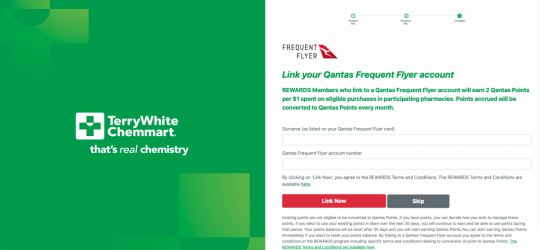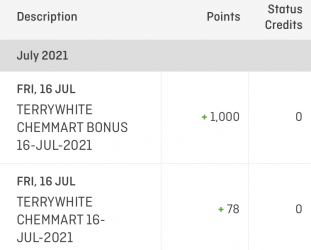- Joined
- Apr 9, 2007
- Posts
- 2,556
I received it. It has been a long time since I shopped at TW.Anyone else just get this? No link to register - but apparently only eligible if you received the email so check your Promotions tab!
View attachment 228507
I received it. It has been a long time since I shopped at TW.Anyone else just get this? No link to register - but apparently only eligible if you received the email so check your Promotions tab!
View attachment 228507
Now Terry White offering 500 QFF points for spending a (random) $49.
Don't think that appeals to me.
Mine was 500 points for $30 this time round, ended 11 Oct, before I had time and pay to go and get something.
Indeed seems random, some got email saying spend $49, me I got 500 offer for spending $30.
As Wandering_fred mentioned, it might depend on if you have been ignoring the TWC offers, and their minimum spend required will drop.
Will wait for their next offer and see what comes.
Its quite a possibility that TWChemart wasn't too pleased that that other chemist company aka SuperPharmacy joined under the WW part of the QFF agreement.I'm still sad to see the end of this.
Any reduction in opportunities to earn QFF points is a backward step (in my opinion).
Totally agree Fred, for years my local 777 pharmac_ bled me dry, so a switch to Chemist Warehouse reduced my expenditure from $75pm to $21.In practice it really depends on your monthly spend on over the counter medications and what is on sale. It may align. It may not.
That is what you find when wandering
Fred
PS Post 65s spend a lot more time and $$ in pharmacies.....
Chemist Warehouse spend a lot on marketing but are not competitive on a lot of their range with supermarket or other pharmacies.Totally agree Fred, for years my local 777 pharmac_ bled me dry, so a switch to Chemist Warehouse reduced my expenditure from $75pm to $21.
Any reduction in opportunities to earn QFF points is a backward step (in my opinion).
TWChemart wasn't too pleased that that other chemist company aka SuperPharmacy joined under the WW part of the QFF agreement.
For the items I buy, they certainly are. Apart from the cheaper scrips mentioned, things like Dove body wash are $13 in Woolies, $6.50 in CW. I only visit them once a month and cherry pick the items I want so I'm well in front.Chemist Warehouse spend a lot on marketing but are not competitive on a lot of their range with supermarket or other pharmacies.

AFF Supporters can remove this and all advertisements
Mine post once a month about the 15th.Update:
Does anyone have experience with this? How long does it normally take for points and bonuses to point from TerryWhite?
KangarooFlyer88
Looks like you were correct about the points posting on the 15th:Mine post once a month about the 15th.
But on the 30th the points go wandering (back to TW)
Fred


